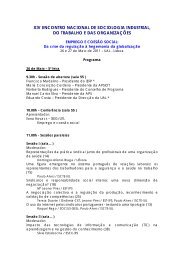Web-based Learning Solutions for Communities of Practice
Web-based Learning Solutions for Communities of Practice
Web-based Learning Solutions for Communities of Practice
You also want an ePaper? Increase the reach of your titles
YUMPU automatically turns print PDFs into web optimized ePapers that Google loves.
252<br />
A Process-Oriented and Technology-Based Model <strong>of</strong> Virtual <strong>Communities</strong> <strong>of</strong> <strong>Practice</strong>s<br />
connecting with other VCoPs, creating subcommunities<br />
around special interest topics,<br />
and sharing best practices. These increases<br />
in in<strong>for</strong>mation and ideas are powerful tools<br />
that benefit VCoPs members and business<br />
schools.<br />
• Social negotiation must be provided <strong>for</strong> as<br />
an integral part <strong>of</strong> learning: other research<br />
has also rein<strong>for</strong>ced the idea that knowledge<br />
accrues through social interaction and cultural<br />
experience, and that learning and social<br />
negotiation are inseparable practices. <strong>Learning</strong><br />
theorists indicate that people learn by coconstructing<br />
their knowledge with the help <strong>of</strong><br />
experts and peers in a situated context. They<br />
assert that by doing so, people are elevated<br />
to new planes <strong>of</strong> knowledge and awareness<br />
(Cole & Engestrom, 1993; Driscoll, 2000;<br />
Lave & Wenger, 1991; Leont’ev, 1981; Luria,<br />
1976; Rog<strong>of</strong>f & Wertsch, 1984; Salomon &<br />
Perkins, 1998; Scribner, 1985; Vygotsky,<br />
1987). As VCoP members interact and learn<br />
from each other, they meet these social and<br />
cultural expectations.<br />
• Learners must be encouraged to own their<br />
learning and basing on his/her existing<br />
knowledge. Ownership as it relates to learning<br />
means that people are aware <strong>of</strong> what<br />
knowledge they need and are involved in<br />
satisfying those needs (Driscoll, 2000).<br />
There<strong>for</strong>e, learners must take control <strong>of</strong><br />
their own learning by seeking <strong>for</strong> answers<br />
to their questions and solutions to their<br />
problems. This is exactly what happens in<br />
in<strong>for</strong>mal learning exchanges – individuals<br />
decide they need to know something to do<br />
their work while they are doing their work<br />
and take steps to learn it (Brandenburg &<br />
Binder, 1999; Sorohan, 1993; Weintraub;<br />
1995). Individuals <strong>of</strong>ten join CoPs to search<br />
<strong>for</strong> knowledge they lack or to share knowledge<br />
they have. Members <strong>of</strong> CoPs help<br />
one another discover knowledge and solve<br />
problems by taking responsibility <strong>for</strong> their<br />
own and other’s Knowledge.<br />
• <strong>Learning</strong> should be just-in-time and should<br />
provide context-specific solutions to problems.<br />
VCoPs members can access needed<br />
resources at any time and from any place.<br />
The ability to identify solutions to problems<br />
right when they are needed most increases<br />
learners’ per<strong>for</strong>mance capabilities. Recent<br />
developments in the design <strong>of</strong> web <strong>based</strong><br />
tools <strong>for</strong> communication and problem solving<br />
suggest new way <strong>of</strong> delivering courses,<br />
<strong>based</strong> on collaborative and skills-<strong>based</strong><br />
learning. In the process <strong>of</strong> getting and giving<br />
answers to solve problems, CoPs members<br />
learn how to acquire what they need to know<br />
and do. Thus, members <strong>of</strong> CoPs become<br />
aware <strong>of</strong> their learning processes as they<br />
learn, they became self directed learners.<br />
In this way, learners are self motivated –<br />
motivated through the wish to do a job more<br />
effectively and achieve greater recognition<br />
<strong>for</strong> it, alongside the capacity to have more<br />
influence in work situation.<br />
In summary, VCoPs enable an efficient and<br />
effective process <strong>of</strong> learning through the sharing<br />
<strong>of</strong> knowledge with a wide range <strong>of</strong> members, and<br />
they enhance action learning process which is<br />
widely recognized in the literature as essential <strong>for</strong><br />
managerial competency development (Gibb, 1997,<br />
Gorman et al., 1997, Deakins & Freel, 1998).<br />
RESEARCH DESIGN<br />
Research Questions<br />
Starting from the above consideration, in our work<br />
we address the following questions:<br />
• Can we define an integrated VCoPs model<br />
that will support all the knowledge management<br />
cycle in a Business School?<br />
• In which way the Knowledge management<br />
organizational and technological aspects are<br />
integrated in a VCoPs?



